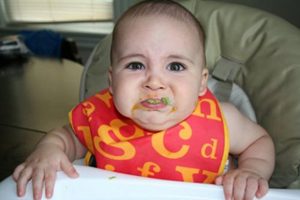You can drag a toddler to organic, hormone-free milk, but you cannot make him drink.
The irony of feeding children is that you can make the best meals, choose the choicest ingredients, do the smartest research and receive the sagest advice, but it is the kid who ultimately decides what goes down the gullet.
We were no different from other parents before having a baby—we were totally judgmental about the food choices other parents made. We knew there would be no fast food passing his lips, no sugary treats like lollipops to eat away his teeth and hype him up before bedtime, no saturated fats or red dye number whatever to break his genetic code or harm his system in unknown ways later, leading to guilt, guilt and more guilt. We were self-confident idiots.
There are dedicated parents who put the best food on the table everyday, package cubed organic cheese in reusable containers and bake their own gluten-free bread (most of them lesbians no doubt), but I am convinced that they will go mad for cow eventually and run screaming to Burger King for a fat and protein fix, and their kid will hoard Twinkies in college. Or so I tell myself.
We did something right at least (before giving in to the path of least resistance); lots of breast milk passed our children’s lips, despite it turning out that only one breast was fully functional, the other merely decorative, resulting in a lopsided condition that was obvious even with my coat on. The first kid nursed for twenty months, the second over two years, the third for just over a year before sleep deprivation made me cry mercy and bring on the dairy products.
So that much was A+ parenting, right? And the oatmeal, peanut butter and green vegetables I consumed while pregnant despite throwing up every day? But yes, the pepperoni and Red Vine licorice our oldest son preferred, the frequent French fries our daughter consumed, and the ubiquitous fish crackers our younger son lived on, were not ideal.
All the good stuff has been there from day one: whole grain bread, yogurt, cut-up apples and broccoli galore—it’s just that since you can’t really force-feed a kid (creating eating disorders has always been low on our priority list), punishment, reward systems or guilt-laden entreaties have been out of the question. No one’s gotten scurvy yet. Maybe that’s thanks to the Flintstones vitamins.
The hope, sort of like the theory of attachment parenting—that if you give them lots of love and attention young they’ll have the confidence to be independent adults later—is that if you let them eat or not eat as hunger dictates, and let them pick and choose from what’s in the cupboards (so yes, you do have some control), they’ll listen to their bodies and grow braver about culinary choices over time.
We crossed our fingers that this would work sixteen years ago, and that our number one son would eventually grow out of his desire for a steady diet of poppy-seed muffins. He used to wake me up every morning at five am by climbing on my chest and yelling, “Muff, muff, muff,” while shaking me by the shoulders.
The results seem encouraging. At eighteen, he’ll eat anything, try unknown foods eagerly, and traveled overseas without once wanting American food. The attachment parenting…well, college is coming, so we’ll soon see.
